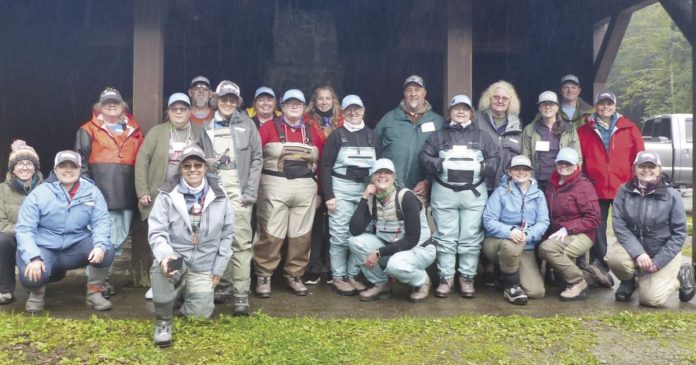The meditative aspects of fly fishing entwine with the medical and social support women are offered at the retreats, Deb Anderson said during an interview March 19 at the Family Air Tours office. Anderson is the local program coordinator and a retreat leader.
This year, the retreat is scheduled to be held in July at a location near Air Marine Harbor, north of Ward Cove.
The retreats are held at no cost to the attendees, who are allowed to attend one time. According to CFR information, more than 40 retreats are held annually in the United States, and similar programs have been started in six other countries.
Anderson said she first got involved with the program in 2013, when she ran across the Casting for Recovery website. She attended a retreat in Talkeetna, which she described as “amazing.”
She immediately was interested in bringing the program to Ketchikan, she said.
In 2014, the Anchorage-based organizers brought a retreat to Ketchikan, and it was held at Orton Ranch.
“We weren’t the head of it at all at that time,” Anderson said.
She was in charge of helping to organize the event, however.
The retreats are three days long. On the first two days, participants get acquainted and attend educational talks both about fly fishing and cancer topics. On the third day, participants head to the fishing grounds to ply their skills with rod and reel.
Ketchikan local Margaret Bethel, who is a participant coordinator and retreat leader, also spoke about the program during the March 19 interview.
She said that two friends started the program — an oncologist who had been diagnosed with breast cancer and her friend who is an avid fly fisherwoman.
Bethel said that when out on a fly fishing excursion with her friend, the oncologist is said to have remarked, “this is like recovery for my arm. This is stretching out my scar tissue. This is meditation — this is calming.”
The seed of the idea for Casting For Recovery was planted, Bethel said, when the oncologist realized how beneficial it would be to find a way to get other breast cancer survivors involved in a similar experience.
The first Ketchikan CFR retreat organized solely by locals was held in 2018, Bethel said. Local retreats followed in 2019 and 2021. The 2021 retreat was held on Prince of Wales Island.
Anderson described some of the benefits of attending a retreat.
“One of the major things” offered at retreats, she said, “is we have an oncologist.”
Bethel mentioned the value of connecting with people during the retreat who have shared the experience of receiving a breast cancer diagnosis.
“Not only having access to a really skilled oncologist,” is valuable, Bethel said, but connecting to a like-minded community is very beneficial.
Anderson said, “it gets pretty heady a lot of the time; pretty emotional.”
Bethel grinned and added, “then we take a break and go fly fishing.”
Anderson laughed and quipped, “they say it’s not all about the fishing — but it is.”
Anderson continued, “it gets pretty involved, and pretty intense — and, you know, pretty personal because there’s just all the things that go along with a breast cancer diagnosis that only you would know — that a survivor would know.”
In addition to an oncologist on the retreat staff, there also is a psychosocial expert at retreats to support the women.
Bethel explained who a psychosocial expert might be.
“So, it can be someone who’s a clinical social worker, a psychologist, any one of those specialties who also has trauma training,” she said.
She added that, “as people open up they start to break down, that person can go in and you can have that moment of skilled care, which is just really great.”
Bethel said that she is a certified lymphatic therapist as part of her work as a physical therapist, and she offers her expertise at retreats. Breast cancer survivors are at high risk for lymphatic problems, she explained.
She added that “breast cancer has particular — especially with mastectomies, those challenges, reproductive challenges — it has its own unique set of things.”
Breast cancer also can trigger relationship issues and difficulty with body changes.
Bethel emphasized, however, that for each participant, “the retreat is really theirs. If you don’t want to touch a fish, you don’t have to touch a fish. If you don’t want to talk about cancer, you don’t have to talk about cancer.”
She added, “we do try to customize it to each person, to help it feel like this supportive environment where you can do as much or as little as you want to do.”
Anderson said that for each retreat, organizers must find one “river helper” for each participant. The river helpers assist people whose balance or strength might not be up to par, and they help with the mechanics of the actual fishing, as well.
When Anderson helped to organize the first retreat at Orton Ranch, she said she recruited a group of friends to act as river helpers. Family Air Tours owner Dave Rocke volunteered to train them in the art of fly fishing, and took the group on two Saturday outings to teach them the basics of fishing and tying flies.
Bethel said that many of the retreat attendees not only may be experiencing physical challenges, but that “some of them have never touched a fish before in their life.”
Anderson said she hadn’t ever fly fished before she attended her first retreat, but quickly learned of its healing properties.
It forces a person to be “present centered,” she said, further explaining that while fly fishing, a person isn’t thinking about one’s cancer, or worrying about family.
Anderson added that, when fly fishing, she is reading the water and concentrating, and called it “play for adults.”
She equated it to her fond memories of being a child in Forks, Washington, when she and her friends would meet at the many streams nearby and toss rocks into the water.
Bethel said the learning component to fly fishing also is compelling. She recalled when Rocke and his friend Dave Smiley were teaching the first batch of river helpers to fly fish.
The pair pointed out the hatch of tiny green insects that were floating above the water, Bethel said, and noted how important it was to assess the environment when fishing.
“The fish were biting on them, so he said, ‘Ok, you have to know this — what’s around you.’ It was very dreamy,” Bethel recalled.
Anderson said she remembered learning that it’s called, “matching the hatch.”
Bethel explained that they also learned that is the reason there is such a wide variety of flies that fly fishers use to catch fish. They can look like those little insects, or they can look like a mouse.
Rocke’s business partner, Jim Davis, who was tying flies at the office with Rocke and fellow fishing enthusiasts at March 19, said that some flies also are created to trigger an “aggression bite.” A fish, especially at certain times of year, will bite an “intruder fly” out of territoriality rather than hunger.
“There’s no hard rules,” he said.
Anderson said another technique she was taught during retreats was to look under the stream’s rocks to see what types of grubs are underneath to assess what type of fly the fish might strike.
“It’s made me a fly fisher,” Anderson said. “From there, I joined another group called ‘Sisters on the Fly.”
The Ketchikan retreat is scheduled to be held from July 8 through July 10.
There are eight spots total for participants, Anderson said, with five spots available as of March 19. “Anyone from Alaska” can sign up, as long as they have been diagnosed at some time with breast cancer.
A fundraiser for the program is set to be held from 6 p.m. to 9 p.m. April 2, at the Alaska King Crab Company in downtown Ketchikan. Anderson emphasized that all are welcome to attend.
Included in the ticket price will be fly tying lessons taught by Rocke and Davis during the event.
Credit: Source link































